Hydro-excavation, a cutting-edge method in the realm of construction, has emerged as a groundbreaking solution that places safety at the forefront of excavation processes. Unlike traditional excavation techniques that involve heavy machinery and manual labor, hydro-excavation utilizes a combination of pressurized water and a high-powered vacuum system to precisely and safely excavate soil. The benefits of hydro-excavation are manifold, starting with its unparalleled safety features. The method significantly reduces the risk of accidents and injuries associated with traditional excavation, where heavy machinery can inadvertently damage underground utilities or pose a threat to workers. With hydro-excavation, the controlled application of pressurized water allows for precise soil removal without the risk of damaging sensitive infrastructure. One of the primary advantages of hydro-excavation is its non-destructive nature. Traditional methods often entail a degree of uncertainty when digging near existing utilities, pipelines, or cables.

In contrast, hydro-excavation minimizes the risk of accidental damage to these vital components. The focused stream of water effectively softens the soil, making it easy to extract without causing harm to nearby structures. This non-destructive approach is particularly crucial in urban environments where underground utilities are densely packed and their exact locations may not be accurately documented. By preventing damage to these essential elements, hydro-excavation ensures the integrity of existing infrastructure, saving both time and resources that would otherwise be spent on repairs. Moreover, hydro-excavation contributes to environmental sustainability. Traditional excavation methods often produce excessive dust and noise pollution, and the use of heavy machinery can lead to soil compaction and erosion. Hydro-excavation minimizes these environmental impacts by utilizing water as the primary means of excavation. The process generates less noise and dust, fostering a more eco-friendly construction site. Additionally, the method’s precision reduces the amount of soil disturbed during excavation, preserving the surrounding landscape and minimizing the need for extensive restoration after the project’s completion.
In terms of cost-effectiveness, hydro-excavation proves to be a wise investment. While the initial setup of hydro-excavation equipment may incur some upfront costs, the long-term benefits outweigh these expenses. The reduction in accidents and damage to underground utilities translates to fewer repair and replacement costs. The efficiency and speed of hydro-excavation also contribute to overall project savings by minimizing downtime and increasing productivity. As construction projects continue to prioritize safety, efficiency, and environmental responsibility, hydrovac excavation companies in Green Bay stands out as a versatile and indispensable technique that aligns with these objectives. In conclusion, the adoption of hydro-excavation in construction not only ensures safety on the worksite but also offers a host of benefits, ranging from precision and environmental sustainability to cost-effectiveness, making it a transformative practice in the ever-evolving construction industry.
